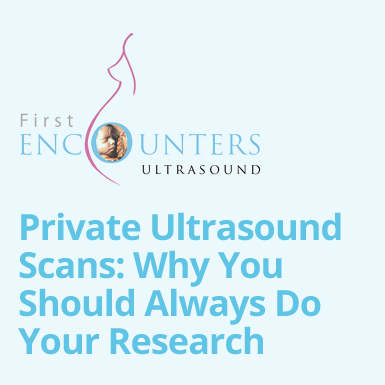
Recently, many worrying stories of unregulated ultrasound scan providers have come to our attention. There's a growing practice of misinformation and cutting corners that can cause customers to be sold a service that does not meet industry standards and, in the worst cases, can even cause mother and child to be put at risk. For this reason, we feel that it is vitally important for us to share this information with our readers, in order to allow expectant parents to make an informed decision when planning a private ultrasound scan.
While all 3D/4D ultrasound companies may seem quite similar at first glance, you may find on closer inspection that the provider you've chosen isn't being entirely honest about the services they offer. Here are some of the issues we've spotted most frequently here at First Encounters:
Misleading Customers Regarding Available Services
We've spotted many scan providers who claim to offer well-known services when in fact they do not use the equipment required to provide that service. One example of this is HD Live ultrasound, which can only truly be delivered using genuine HD Live equipment. We use an HD Live machine to conduct scans at our clinic in Cardiff, whereas at our Bristol clinic uses a GE Voluson I. Many providers will advertise that they offer 'HD Live' scanning, when in fact, they use other, inferior equipment to perform their scans.
Operating Without Regulation
In England, it has been mandatory for ultrasound providers to register with the CQC (Care Quality Commission) since 2010, yet some providers still attempt to avoid this requirement by claiming that their scans are 'for entertainment purposes only'. Those operating without regulation will often employ staff who have not been trained to a professional standard, and will use equipment that has not been properly tested - all without being subject to any independent inspections. To comply with English law and provide the highest level of service possible, First Encounters Bristol is approved, registered and regulated by the CQC, and is subject to regular checks to validate the quality of our services.
While our Cardiff clinic is unable to register with the CQC due to being based in Wales, not England, we do ensure that it meets the same standards as the Bristol clinic at all times. Many similar providers in Wales neglect to do so, due to the fact that the HIW (Health Inspectorate Wales) does not currently regulate the same diagnostic and screening activities as those monitored by the CQC in England. This is something to keep in mind when booking in Wales, as this makes it easier for unscrupulous scan providers to operate without detection.
Potentially Unsafe Equipment
As we've already touched upon, we strive to use the most up-to-date ultrasound equipment at our facilities. All of our equipment is purchased directly from the manufacturer, who gives us the knowledge required to set up and use these products properly. We also ensure that this equipment is inspected and serviced on a regular basis, in order to confirm that it is safe for use at all times.
Many scan providers do not meet the same standard, sourcing equipment second-hand and setting it up without the proper knowledge. One particular risk comes from providers who do not properly isolate the equipment they are using - this is very dangerous as it can lead to electric shocks!
Unqualified Sonographers
Alongside their use of unmonitored and unreliable equipment, many independent scan providers will employ staff who are not properly qualified to perform a baby scan. In some cases, this will mean using sonographers who do not have any previous experience performing baby scans, rendering them unaware of what exactly to look for during a scan. In the worst cases, companies may use individuals who are not qualified whatsoever, a practice we view as highly irresponsible.
At both First Encounters clinics, scans are performed by qualified obstetric sonographers, which means that they have both the knowledge needed to operate ultrasound equipment and the experience needed to perform a baby scan and diagnose potential problems. Each of our sonographers is also registered with the Health and Care Professions Council (HCPC), which regulates their practice and ensures that they have the right skills and training to do their jobs.
So, Are Private Ultrasounds Safe?
In general, private ultrasounds are equally as safe as an NHS service; however, if you are concerned about a company's credentials as a responsible scan provider, here are a few things you can look out for:
- Are they registered with the correct regulatory bodies? Is there evidence of this on their website?
- Do they mention that their practice is for 'entertainment only' or 'non-diagnostic'? These could be warning signals that the practice is unregulated.
- Does their equipment/staff register measure up with the services advertised?
- Are their prices significantly lower than those other practices? If a price or deal seems too good to be true, it probably is!
More Info About First Encounters >
